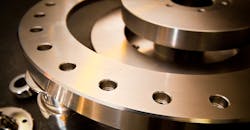Machine Tooling Is Vital to a Robust US Innovation Pipeline
Opinion/Analysis
At the outset of the coronavirus pandemic, supply chain disruptions caused shortages that left many essential workers without personal protective equipment, stores with empty shelves and long delays in online orders. To address this challenge, President Joe Biden called for more secure and resilient supply chains and took swift action with the goal of advancing national security, economic security, the fight against climate change and American technological leadership.
President Biden has committed to building domestic manufacturing capacity, increasing job quality and worker readiness, investing in and commercializing new products and strengthening relations with America’s allies and partners while moving us closer to an equitable clean energy economy.
These solutions will each require persistence, but they will also require a foundational element of supply chain resilience—machine tools.
Almost everything you touch was made on a machine tool somewhere. Machine tools make U.S. production possible because they allow the country to manufacture parts such as molds, seat mounts, screws, turbines, engine bearings, aircraft structures and even N95 respirators. Machine tools are also essential to clean-energy technologies that will enable the U.S. to add renewables and electric cars to the grid.
American advances in machine tools revolutionized manufacturing over the last century and led to massive increases in productivity. In the 1980s, the migration of manufacturing overseas accelerated, and the machine tool sector began leaving the U.S.
America’s capacity to design, make and use advanced machine tools has consequently eroded. According to the 2020 World Machine Tool Report, the U.S. has not been the global leader in machine tool production since 1982. We have trailed both Japan and Germany since 1984. China since 2009. An industrial skills gap and aging workforce has exacerbated America’s capacity challenge.
Investing heavily in its global position in the machine tool sector, China has out-produced our sector since 2009. Today their market is nearly four times the size of ours. China’s export advantage in numbers and diversified sales to many developing countries increases their global footprint, influence and opportunity to deny us access when desired.
In the event of a national emergency, fragility in the machine tool sector could have significant national security implications. Without greater access to domestic machine tools, our country loses flexibility in its capacity to manufacture essential goods. To ensure our warfighters have everything they need, the Department of Defense wants to ensure that we have the potential to make whatever the nation requires. The U.S. would also benefit by working more closely with our international partners’ best machine tool R&D and manufacturing companies.
In addition to advancing national security, machine tools will also help arm the nation with the clean energy technologies we need to combat the climate crisis. The departments of Energy and Defense are committed to positioning the U.S. as the world leader in clean energy manufacturing. A robust machine-tool capacity and capability will ensure that critical clean energy technologies—from electric vehicle batteries to solar modules and wind turbines—are made in America.
To rapidly begin to re-build U.S. industrial capabilities in this area, the Department of Defense (DoD), the Department of Energy’s (DoE) Oak Ridge National Laboratory (ORNL) and the Institute for Advanced Composites Manufacturing Innovation created America’s Cutting Edge (ACE), a public-private partnership in the Knoxville, Tennessee, area to close the skills gap and restore American machine tool leadership.
Using the most advanced computing, robotics, and material design capabilities available, ACE is developing dramatic improvements in current machine tools in order to leapfrog other countries and ensure American leadership in the future of production. The ACE approach puts makers and manufacturers at the center of its strategy with substantial federal support from DoD and DoE’s Advanced Manufacturing Office. ACE focuses on training new experts, reducing costs for small and medium manufacturers and machine shops, researching productivity innovations to save time and commercializing advancements.
Through a combination of online and practicum courses, ACE marries top national experts with students from all experience levels who are energized by manufacturing goods here in America. To date, ACE has created and delivered free courses and boot camps in the automated control of machine tools to more than 1,550 students from 46 states.
One ACE-developed tool has saved small and medium manufacturers more than 28,000 machine hours and $3.8 million in costs—with potential savings for the broader U.S. industry in the billions. Since small manufacturers operate with small margins, low-cost, easy-to-use tools can be the difference between winning and losing a contract—between profitability and bankruptcy.
The ACE research community focuses on the enablers needed for the competitiveness of the U.S. machine tool sector. They understand what machine shops across the country can afford and develop big and long parts with small-volume machines. Using inexpensive materials like concrete, they are reducing lead times and addressing the U.S. affordability gaps. New materials and processes could enable much cheaper forging and casting.
ACE also showed how manufacturing capacity provides flexible response to national concerns; it played an important role in responding to the pandemic. The Department of Defense directed ACE to create new tooling to accelerate the production of personal protective equipment. The result: In weeks, ACE designed and produced tools and molds that enabled production of 500,000 new N95 respirators, 3 million surgical masks, and 40,000 face shields per day. ACE’s response to the coronavirus pandemic also enabled industry to create 1,500 new manufacturing jobs.
A more vibrant machine tool sector will provide a sound foundation for the future of defense industrial production and clean energy manufacturing. New machines and ways of using them will ensure the U.S. can make what it needs, and an expanded, inclusive industrial workforce will energize the sector and begin the process of reclaiming American leadership in the foundations of industrial production.
Jesse Salazar is deputy assistant secretary of defense for Industrial Policy, and Kelly Speakes-Backman is principal deputy assistant secretary for the Office of Energy Efficiency and Renewable Energy at the U.S. Department of Energy.
About the Author

Jesse Salazar
Deputy Assistant Secretary for Industrial Policy, U.S. Department of Defense
Appointed in February, 2021, Mr. Jesse Salazar serves as the Deputy Assistant Secretary of Defense for Industrial Policy. In this role, he leads the Industrial Policy team as they assess, protect, and promote the Defense Industrial Base. He advises the Under Secretary of Defense of Acquisition and Sustainment on the health of the Industrial Base to ensure a robust, secure, resilient, and innovative industrial capabilities upon which the Department of Defense can rely to fulfill current and future Warfighter requirements.
Prior to his appointment in Industrial Policy, Mr. Salazar led global external relations for the Advanced Industries practice of McKinsey & Company, where he managed the development and dissemination of vital industrial research on the automotive, machinery, advanced electronics, semiconductors, aerospace, and defense sectors, as well as industry stakeholder engagement. He also served on McKinsey’s Advanced Industries COVID-19 global leadership team and supported several industrial and manufacturing research partnerships with the World Economic Forum.
Mr. Salazar served as Vice President of Content Design and Vice President of Communications at the Council on Foundations. He also worked to strengthen minority and small businesses and ensure inclusive economic growth, as Vice President of Government Affairs and Policy at the U.S. Hispanic Chamber of Commerce. He held additional roles as Special Assistant and Field Representative to U.S. Senator Robert P. Casey Jr., Commissioner of Latino Affairs for the Commonwealth of Pennsylvania, and Pennsylvania Communications Director for SEIU. Mr. Salazar also taught in the Carey School of Business at Johns Hopkins University.
Passionate about nonprofit service, Mr. Salazar supports national efforts to create life-sustaining employment opportunities as secretary of the board for the nonprofit Generation USA. He also serves on the board for Baltimore Center Stage, the State Theater of Maryland. Mr. Salazar is a Fellow with the Truman National Security Project and chair emeritus for The Communications Network.
He holds an MA in History from Princeton University, where he received the Davis Merit Prize and the Andrew W. Mellon Fellowship for Advanced Humanistic Studies, and he earned a BA with honors from the University of Pennsylvania. Mr. Salazar resides with his husband in Baltimore, MD.
